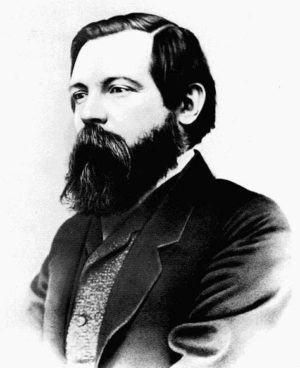
At a certain, very primitive stage of the development of society, the need arises to coordinate under a common regulation the daily recurring acts of production, distribution and exchange of products, to see to it that the individual subordinates himself to the common conditions of production and exchange.
This regulation, which is at first custom, soon becomes law. With law, organs necessarily arise which are entrusted with its maintenance – public authority, the state. With further social development, law develops into a more or less comprehensive legal system.
The more complicated this legal system becomes, the more its terminology becomes removed from that in which the usual economic conditions of the life of society are expressed. It appears as an independent element which derives the justification for its existence and the reason for its further development not out of the existing economic conditions, but out of its own inner logic, or, if you like, out of “the concept of will.”
People forget the derivation of their legal system from their economic conditions of life, just as they have forgotten their own derivation from the animal world. With the development of the legal system into a complicated and comprehensive whole the necessity arises for a new social division of labor; an order of professional jurists develops and with these legal science comes into being.
In its further development this science compares the legal systems of various peoples and various times, not as the expression of the given economic relationships, but as systems which find their justification in themselves. The comparison assumes something common to them all, and this the jurists find by summing up that which is more or less common to all these legal systems as natural law.
However, the standard which is taken to determine what is natural law and what is not, is precisely the most abstract expression of law itself, namely, justice. From this point on, therefore, the development of law for the jurists, and for those who believe them uncritically, is nothing more than the striving to bring human conditions, so far as they are expressed in legal terms, into closer and closer conformity with the ideal of justice, eternal justice.
And this justice is never anything but the ideologized, glorified expression of the existing economic relations, at times from the conservative side, at times from the revolutionary side. The justice of the Greeks and Romans held slavery to be just. The justice of the bourgeois of 1789 demanded the abolition of feudalism because it was unjust. For the Prussian Junker even the miserable Kreisordnung [legislation establishing distinct local authorities.-Ed.] is a violation of eternal justice.
The conception of eternal justice therefore varies not only according to time and place, but also according to persons, and it belongs among those things of which Mülberger correctly says, “everyone understands something different.” While in everyday life, in view of the simplicity of the relations which come into question, expressions like right, wrong, justice, conception of justice, can be used without misunderstanding even in relation to social matters, they create, as we have seen, hopeless confusion in any scientific investigation of economic relations, in fact, much the same confusion as would be create in modern chemistry if the terminology of the phlogiston theory were to be retained. The confusion becomes still worse if one, like Proudhon, believes in this social phlogiston, “justice,” or if one, like Mülberger, declares that the phlogiston theory no less than the oxygen theory is perfectly correct.
https://www.marxists.org/archive/marx/works/1872/housing-question/ch03.htm
Suggest you rename this in subject line. One of many great passages from Engels’s study of the housing problem in Manchester but this quotation is about law and justice, not housing.
Thx. Excellent point. What I get from the quote is that it describes the process by which productive relations which arise objectively from human needs and activities are turned into a legal system that exists over time in a sphere such that people lose track of the underlying economic foundation of production relations. Thus, I renamed it Productive Relations and Legal System. Appreciate your comment.